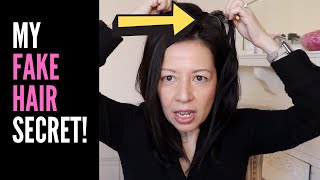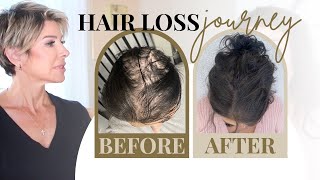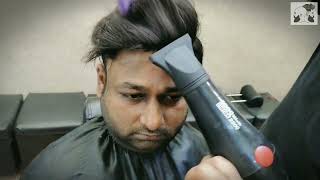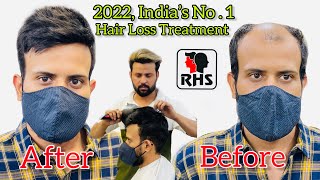Birth Control and Hair Loss: What Is Their Connection?
- Posted on 02 October, 2020
- Hot Topic
- By SNY Admin
Would you have ever imagined that the same pill that prevents a fetus from growing in your womb could also be responsible for preventing your hair from growing? Hair loss is the last thing you’re worried about when you’re on birth control pills.
You may have noticed that you lose a fair amount of hair when you’re on the pill, but you definitely didn’t go on birth control for hair loss, so what could the problem be? Why do you experience hair loss from birth control? What is the connection between birth control and hair loss? Well, we’re about to find out.
How Birth Control Pills Work
Naturally, what makes a woman pregnant is the surge in estrogen—the female hormones—,, which causes a mature egg to move from the ovaries during the menstrual cycle.
What birth control pills do is that they prevent the woman from getting pregnant by stopping the rise in estrogen so that eggs are not released from the ovaries. Some of them work by thickening the mucus around the cervix, which deters sperm cells from swimming up to the egg.
Some birth control pills also work by changing the uterus’s lining so that if an egg mistakenly gets fertilized, it will not be able to implant and grow.
Birth control doesn’t only come in the form of the pill, it can take several other forms like shots, implants, patches, and vaginal rings, and they all work in unique ways. Having known all this, what then causes hair loss on birth control? Let’s find out.
The Relationship Between Birth Control Pills and Hair Loss
Women who have a long family history of hair loss due to hormones changes will usually feel the effect when they use birth control pills. The pill can also result in hair loss for women who are sensitive to the hormones in the pill.
Hair usually grows in from the hair follicles during the anagen phase, known as the active phase in the hair growth cycle. The anagen phase can last around two years for some women and up to seven years for others.
After the Anagen phase comes the catagen, which is the transitional stage; during this phase, which can last up to 20 days, hair growth stops and moves to the final stage, known as the telogen phase.
The telogen phase is the resting phase, during which hair doesn’t grow at all. This resting phase can span a total of one hundred days. Hair growth doesn’t only stop during this period, hair is shed throughout the one hundred days, and this is the most natural cause of hair loss in both men and women.
I’m sure you’re still wondering, “Hair loss, birth control, where’s the connection?” Well, what birth control pills do is that they make the hormones push the hair from the hair growth phase (anagen) to the resting phase (telogen/hair shedding phase) in a matter of days. This condition is known as telogen effluvium.
For women whose family has a history of pattern baldness, whether it happens to the men or both men and women in the family, their chances of suffering from hair loss are higher.
Some Birth Control Pills That Cause Hair Loss
If you’re worried about hair loss, probably because you know that you’re sensitive to the hormones in the pill, you should consider staying away from any drug that is high in androgen, and that is according to the American Hair Loss Association (AHLA)
AHLA suggests that Desogestrel-Ethinyl estradiol is among the best oral contraceptives to use. The American Hair Loss Association also claims that oral contraceptives offer more advantages than disadvantages to women, but if the balding becomes severe, you should opt for non-hormonal oral contraceptives.
Some of the contraceptives you need to stay away from will include the following few:
- Norplant: these are tiny today that get implanted just beneath the skin. They continually release a programmed dose of progestin that prevents ovulation.
- Depo-Provera: the also prevent ovulation, but they’re injections
- Ortho Evra: this one releases estrogen and progestin and is usually placed on the buttocks or shoulders.
- NuvaRing: this is a vaginal ring that is placed carefully inside the vagina. It uses a combination of Ethinyl estradiol vaginal system and progesterone acetate that prevents the sperm cells from fertilizing the egg.
Birth Control Pills That Don't Make You Go Bald
Birth control, hair loss, and related hair loss issues can be solved with ease if you simply consult your doctor before you start taking the pill. However, AHLA suggests that you take a birth control pill that has low androgen as it would reduce hair thinning and other symptoms of alopecia. Some of these include:
- Desogen and Reclipsen, which are both desogestrel-Ethinyl estradiol
- Nor-QD, Aygestin, and Lyza, which are norethindrone
- Ovcon-35, Ortho-Novum 7/7/7, Brevicon, Modicon, and Tri-Norinyl, which are under the class of norethindrone-Ethinyl estradiol
- Ortho Tri-Cyclen and Ortho-Cyclen, are under the class of norgestimate-Ethinyl estradiol.
Most of the pills mentioned above are oral contraceptives, and they have minimal or no side effects at all.
Preventive Measures For Hair Loss During Birth Control
From all that has been revealed in this article, it is quite clear that all you need to do is ensure that you are aware of your family history related to hair loss, whether it is due to birth control or not. That is the foremost preventive measure that you can take.
However, if you have lost your hair due to birth control and you’re finding it challenging to regain the lost hair, you can use a simple life-long solution to the problem; scalp micropigmentation for women.
With scalp micropigmentation, you don’t have to worry about hormones, side effects, and whatnot; you simply get your beautiful look back with a smart hair tattoo that replicates the hair follicles on your head to create an illusion that you still have your hair. It is as simple as it sounds.
Conclusion
As you now know, most birth control pills mess with your hair follicles, and there’s only very little you can do about it. However, birth control isn’t the only way to lose hair. Check out this article on hats and hair loss to find out how frequent use of hats can affect your hair growth.




